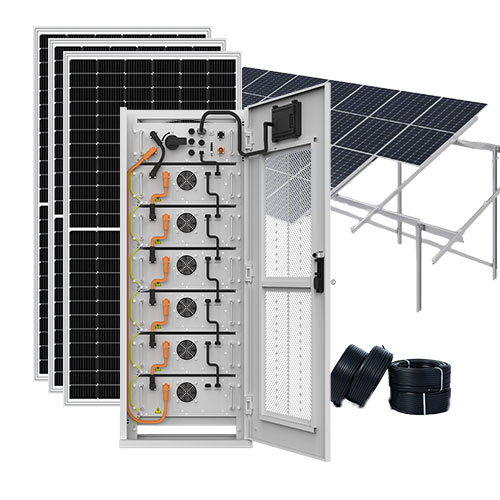Kühlhäuser gehören zu den energieintensivsten Lagern im gewerblichen Sektor. Ob Lebensmittel, Arzneimittel oder andere temperaturempfindliche Produkte – in diesen Anlagen müssen rund um die Uhr strenge Umweltkontrollen eingehalten werden. Jede Unterbrechung der Stromversorgung – selbst für wenige Minuten – kann zu erheblichen Produktverlusten, Verstößen gegen Vorschriften und Betriebsausfällen führen.
Um die Leistung rund um die Uhr aufrechtzuerhalten und die Energiekosten langfristig zu senken, setzen viele Anlagenbesitzer auf Solarstromlösungen, die die Erzeugung vor Ort mit Energiespeichertechnologien kombinieren.

Das Energieprofil des Kühllagerbetriebs
Kühlhäuser zeichnen sich dadurch aus, dass ihr Lastprofil Tag und Nacht relativ konstant bleibt. Anders als in Bürogebäuden oder Produktionsstätten nimmt der Energieverbrauch nach Geschäftsschluss nicht ab. Kontinuierliche Kühlsysteme, Umluftventilatoren und Temperaturüberwachungsgeräte müssen rund um die Uhr ohne Unterbrechung laufen.
In diesem Zusammenhang kann die ausschließliche Nutzung von Netzstrom sowohl finanziell als auch betrieblich riskant sein. Deshalb netzunabhängiges kommerzielles Solarsystem mit Lithiumbatterie ist eine immer beliebtere Wahl für die Energiesicherheit. Sie ermöglicht Lagerbetreibern, auch bei Stromausfällen oder Spitzenlastzeiten konstante Bedingungen im Lager aufrechtzuerhalten.
Deckung des nächtlichen Energiebedarfs mit Solarenergie
Eine typische Solaranlage erzeugt tagsüber Strom, doch der Betrieb von Kühlhäusern benötigt mehr Energie als Solarenergie. Diese Herausforderung wird durch die Integration von Energiespeichern – meist Lithium-Ionen-Batterien – in die Systemarchitektur gelöst.
Eine richtig konzipierte kommerzielles Solarenergiesystem Die Batterien sind groß genug, um tagsüber überschüssigen Strom zu speichern und über Nacht zu entladen. Diese Anlage unterstützt nicht nur Kühlaggregate, sondern auch Beleuchtung, Sicherheitssysteme und automatisierte Überwachungsgeräte, die für den Lagerbetrieb unerlässlich sind.
Fortschrittliche Steuerungssysteme können außerdem dabei helfen, Lasten in Echtzeit auszugleichen, die Speichernutzung vorherzusagen und die Energieverteilung auf der Grundlage betrieblicher Prioritäten zu optimieren.
Strategische und finanzielle Vorteile
Mit einem Solarstromerzeugungssystem zur Stromversorgung von Kühlhäusern bringt sowohl unmittelbare als auch langfristige Vorteile:
Kostenstabilität: Unternehmen sind vor Energiepreisschwankungen und steigenden Zöllen geschützt.
Betriebskontinuität: Mit einer Batterie-Notstromversorgung läuft die Kühlung ohne Unterbrechung – selbst bei einem Netzausfall.
Nachhaltigkeit: Die Erzeugung erneuerbarer Energien vor Ort trägt zur Erreichung der CO2-Reduktionsziele des Unternehmens bei und berechtigt möglicherweise zu Anreizen für grüne Energie.
Standortunabhängigkeit: Abgelegene oder halbstädtische Lager können unabhängig von einer instabilen Netzinfrastruktur betrieben werden.
In einem Sektor, in dem eine unterbrechungsfreie Stromversorgung von entscheidender Bedeutung ist, bieten Solaranlagen mit integriertem Speicher eine hocheffektive und zukunftssichere Lösung. Durch die Kontrolle über Energieerzeugung und -nutzung können Betreiber von Kühlhäusern Betriebsrisiken reduzieren, langfristige Kosten senken und ihre Widerstandsfähigkeit gegenüber der Netzabhängigkeit stärken.
Für Unternehmen, die sowohl Energieeffizienz als auch Betriebssicherheit anstreben, ist Solarenergie keine Option mehr – sie ist strategisch.

Add :5th Floor, Building B, No.2817 Kaichuang Avenue, Science Zone, Huangpu District, Guangzhou, China
Anern Industry Group Limited Alle Rechte vorbehalten
.Xml | Datenschutzrichtlinie  NETZWERK UNTERSTÜTZT
NETZWERK UNTERSTÜTZT